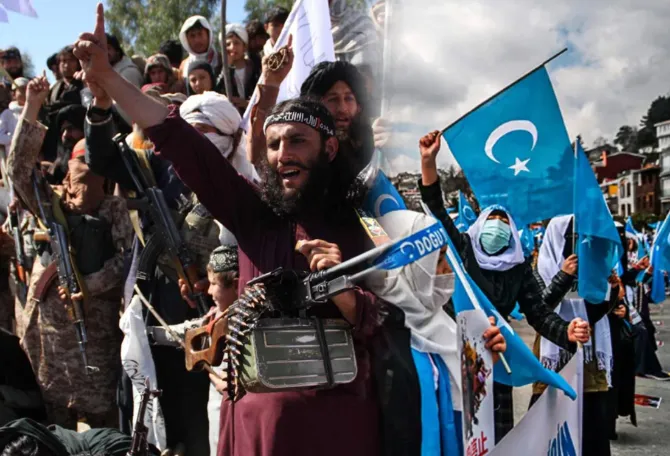
On 13 September, Afghanistan’s acting Prime Minister, Mohammad Hasan Akhund, and the Foreign Minister, Amir Khan Muttaqi, welcomed China’s newly appointed ambassador, Zhao Sheng, at the presidential palace in Kabul. Subsequently, the Chinese embassy in Afghanistan urged the international community to continue engaging in dialogue with the Taliban and, in turn, encouraged the Taliban to adopt moderate policies and establish an inclusive government. The embassy's statement also criticised the West and certain countries, asking them to learn from the situation in Afghanistan, abandon double standards on terrorism, lift sanctions, and return the country's overseas assets. The Taliban viewed this occasion as an opportunity to encourage other nations to engage with the Islamic Emirate. Beijing’s renewed intimacy with the Taliban speaks of China’s double standards as it continues to carry out cultural genocide against Muslim minorities in the restive Xinjiang region that borders Taliban-ruled Afghanistan. In the last week of August, Xi Jinping made a surprise visit to Xinjiang and urged Chinese Communist Party (CCP) officials to deepen control over “illegal religious activities” to preserve the “hard-won social stability”. Beijing, under its authoritarian Xinjiang policy, considers “wearing a veil”, growing “a long beard”, and violating the CCP's “family planning policy” as illegal religious activity or extremism.
The Chinese embassy in Afghanistan urged the international community to continue engaging in dialogue with the Taliban and, in turn, encouraged the Taliban to adopt moderate policies and establish an inclusive government.
China’s foreign policy involves self-driven diplomacy and hegemonic pursuits to achieve its security, and its geoeconomic and geopolitical interests. This foreign policy agenda explains China’s cultivation of ties with the Taliban. However, China's domestic policy is different; it involves the suppression of secular Uyghur Muslims on flimsy pretexts of illegal religious activity aimed at Sinicising them.
Tango with the Taliban, tyranny towards Uyghurs
Amidst recent global contestations and competition among major powers, Beijing has taken a more proactive approach towards the Taliban-led Afghanistan. These steps aim to bolster China's regional influence and counter the United States' encirclement strategy by expanding its “circle of friends” for security- and geoeconomics-related reasons. China has proactively established diplomatic ties with the second Taliban regime, having held over 142 diplomatic engagements with the group after August 2021. However, the groundwork for this prompt decision was laid well in advance. China maintained cordial relations with the first Taliban regime from 1996 to 2001. The primary focus of the relationship was to negotiate security guarantees regarding the volatile Xinjiang region from the Eastern Turkestan Islamic Movement (ETIM), which had established its base in Afghanistan in 1998. Chinese officials met with Taliban leader Mullah Omar to contain any “spillover” of terrorism to Xinjiang. During the meeting, Omar guaranteed that the Taliban would not allow Uyghurs to launch attacks in Xinjiang. However, he also stated that Uyghurs would remain in the Taliban's ranks. Internally, in Xinjiang, China used the war on terror after September 2001 to target the cultural ethos and religious fabric of Uyghur Muslims, supplemented with a strategy of creating demographic imbalance through increased Han migrations. Subsequently, in 2009, the economic exploitation, Sinicisation, and suppression of the province’s secular Islamic culture led to widespread ethnic riots within Xinjiang. The inception of the much-hyped Belt and Road Initiative (BRI) in 2013 made Xinjiang—the starting point of many of the BRI’s ambitious connectivity projects to Central Asia, Europe, and Eurasia—strategically and economically important. In 2014, Xi stressed building a “Great Wall of Iron” to protect national unity and solidarity in restive Xinjiang and secure the BRI, the “project of the century”.
Chinese officials met with Taliban leader Mullah Omar to contain any “spillover” of terrorism to Xinjiang.
In August 2016, Party Secretary Chen Quanguo, known for his anti-minorities policies and as China’s ethnic policy innovator, was sent to Xinjiang to roll out the securitisation strategy. He started high-tech surveillance and carried out DNA profiling of the Muslims of the region, making Xinjiang the most militarised zone in China. By 2017, under Xi’s guidance, the CCP invested millions of dollars to construct 1,200 detention centres and jailed more than 1 million Muslims, including Uyghurs, Kazaks, Uzbeks, and Kyrgyz. In these detention centres, Muslims were forced to pledge loyalty to the CCP and denounce Islam and Islamic culture, including sporting long beards and wearing veils. In 2017, Muslims were banned from performing Namaz (prayers). Violations of the ban attracted fines and consignment in detention camps. Meanwhile, China showed a growing interest in the fundamentalist Taliban and established direct communication with them. Beijing hosted a Taliban delegation in 2019 after US President Donald Trump cancelled talks with the outfit. In July 2021, the Taliban were hosted in Tianjin City by Chinese Foreign Minister Wang Yi, who described them as a “pivotal force”. Following the Taliban's takeover of Afghanistan, China quickly pledged humanitarian aid of US$13 million and stated that establishing a new interim government was necessary to restore order in Afghanistan. China has also actively sought international support to rebuild Afghanistan, lift sanctions, and unfreeze Afghan foreign assets. In addition, Beijing has taken steps to solidify its ties with the Taliban by importing Afghan goods without tariffs and investing US$550 million for the next three years to extract oil from Afghanistan. More recently, the Chinese telecom company, Huawei, was contracted by the Taliban to install CCTV cameras for surveillance, further increasing China's influence over the fundamentalist group.
Beijing has taken steps to solidify its ties with the Taliban by importing Afghan goods without tariffs and investing US$550 million for the next three years to extract oil from Afghanistan.
In return, the Taliban has relocated Uyghur fighters from the China-Afghanistan border and increased the surveillance of 2,000 ethnic Uyghurs, who have lived in Afghanistan for decades. However, the Tehrik-i-Taliban Pakistan (TTP) still poses a significant threat to China’s security and economic interests, especially to the China-Pakistan Economic Corridor (CPEC) projects in Pakistan. The TTP was responsible for a suicide bombing in Northern Pakistan in July 2021, killing nine Chinese workers. Between August 2021 and August 2022, 433 civilians and security personnel died in 250 TTP attacks. The Taliban and TTP are closely allied ideologically and have fought together against the US-led NATO forces in Afghanistan. Beijing has sought the Taliban's help to tame TTP to secure CPEC and Chinese workers in Pakistan. The situation in Afghanistan has become increasingly concerning, with the Taliban becoming more repressive towards women and girls, banning them from schools and depriving them of basic rights. This repression has only worsened, with Kabul recently banning all political parties, citing Islamic laws. The increasing economic and political ties between China and the Taliban have limited the options for democratic nations and the United Nations to push for women's rights and the formation of an inclusive government. With the help of Beijing, the Taliban has even taken control of 14 diplomatic missions abroad, including those of Pakistan, Russia, China, Kazakhstan, and Iran, amid global isolation. The opportunistic collusion between Islamist and Communist forces has created an environment for the persecution of minorities in both countries. However, given the presence of other terror outfits in the AfPak region, Beijing’s tango with the regime in Kabul will only fetch temporary gains for both sides. In the long run, this arrangement will prove to be counterproductive.
Ayjaz Wani is a Fellow with the Strategic Studies Programme at the Observer Research Foundation.
The views expressed above belong to the author(s). ORF research and analyses now available on Telegram! Click here to access our curated content — blogs, longforms and interviews.




 PREV
PREV


